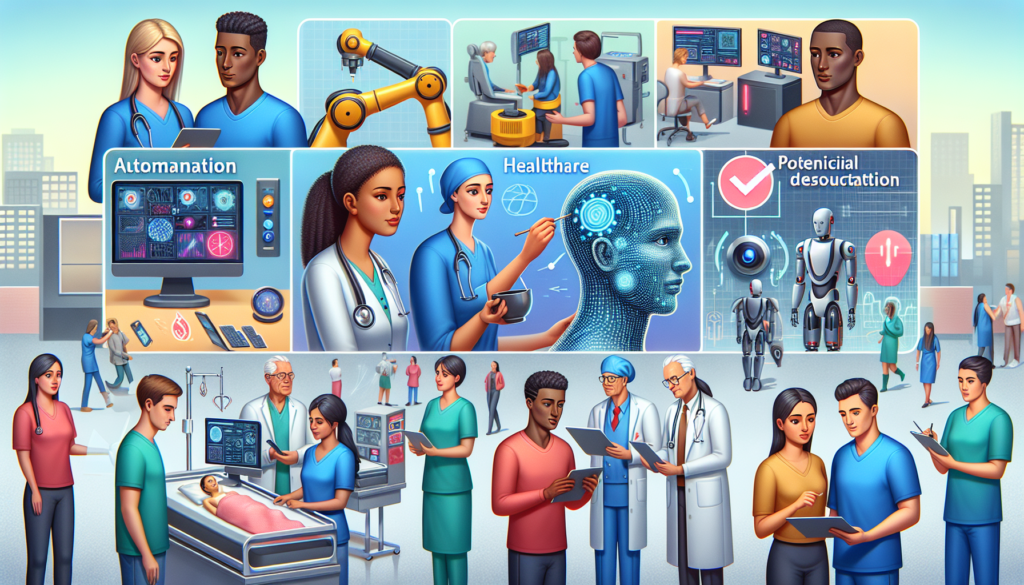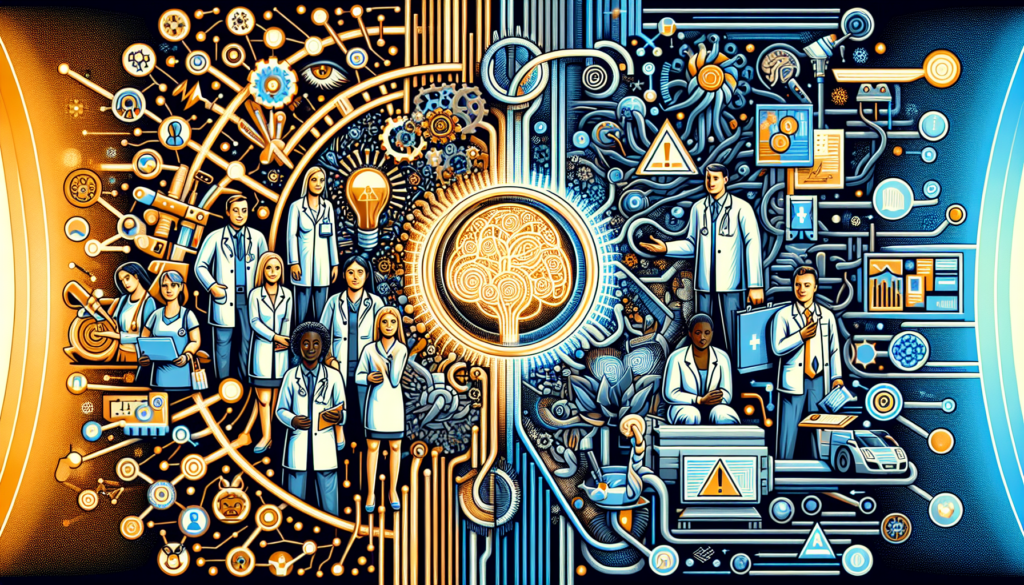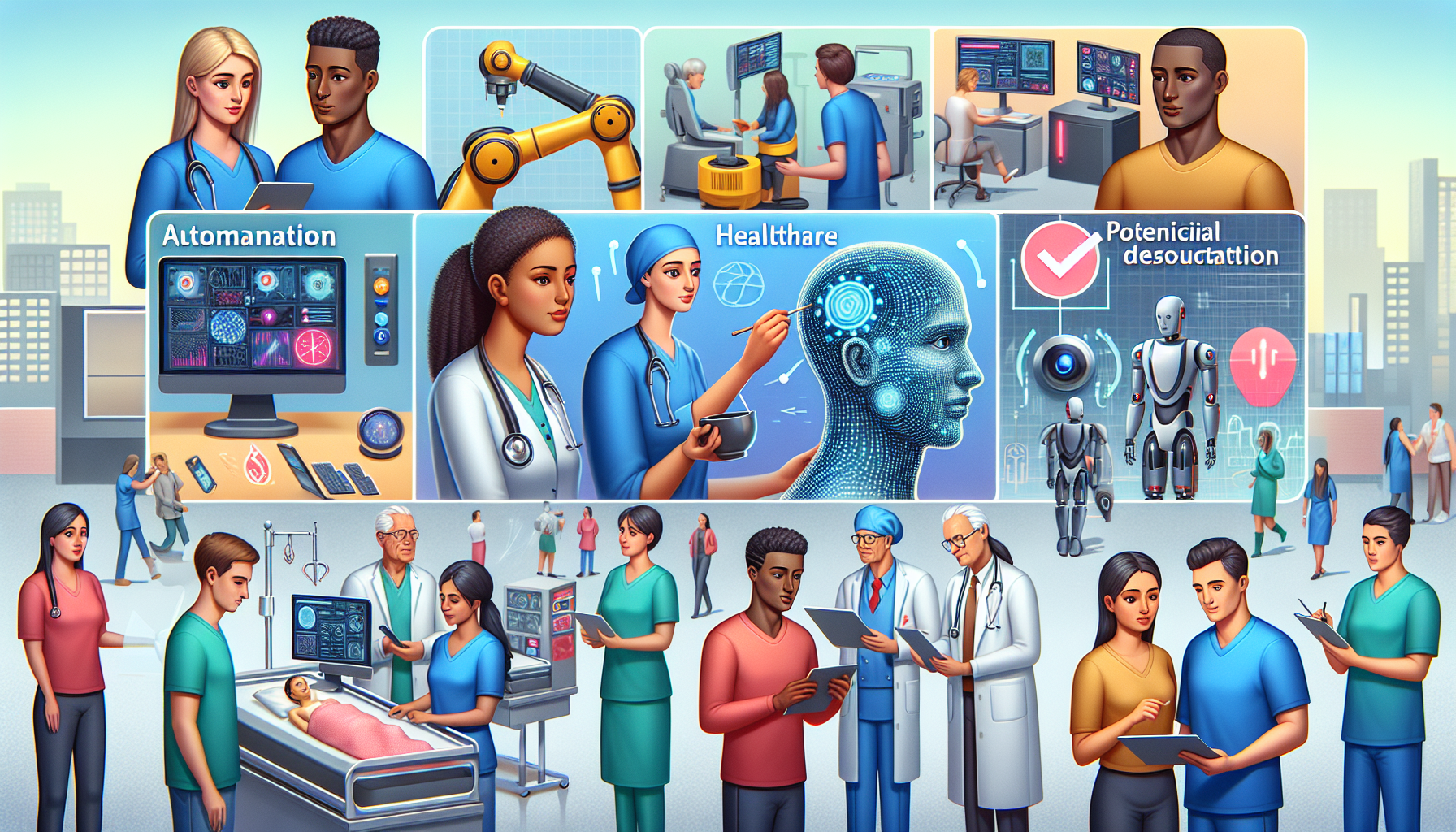In this day and age, it’s hard to ignore the pervasive influence of Artificial Intelligence (AI) on our lives. From voice-activated virtual assistants to personalized movie recommendations, AI is seamlessly integrated into various aspects of our daily routines. But have you ever stopped to ponder, “What does AI do to humans?” This article aims to shed light on the impact that AI has on our lives, exploring both the benefits and potential concerns associated with this rapidly advancing technology. So, fasten your seatbelts as we embark on a journey to uncover the fascinating world of AI and its effects on us humans.
Increase Efficiency and Productivity
Automation of Repetitive Tasks
AI technology has revolutionized the way businesses operate by automating repetitive tasks. This allows employees to focus on more complex and creative work, leading to increased efficiency and productivity. For example, AI-powered software can automatically generate reports, process large amounts of data, and perform routine administrative tasks, saving valuable time and effort.
Enhancing Decision-Making
AI can also enhance decision-making processes by providing data-driven insights and analysis. Machine learning algorithms can quickly analyze vast amounts of data and identify patterns and trends, helping businesses make more informed decisions. This not only saves time but also improves the accuracy and reliability of decision-making, leading to better outcomes and increased success.
Streamlining Business Processes
With AI, businesses can streamline their operations and workflows. AI-powered systems can automate various business processes, such as supply chain management, inventory control, and customer relationship management. By reducing manual intervention and optimizing processes, organizations can achieve greater efficiency and productivity, ultimately improving their overall performance.
Improving Workforce Collaboration
AI technology can also facilitate better collaboration among employees. Through AI-powered communication and collaboration tools, teams can work together more effectively, regardless of their geographic locations. Virtual assistant technologies can help schedule meetings, manage tasks, and facilitate seamless communication, enabling teams to collaborate in real-time and enhance their productivity.
Transforming Industries
Automotive Industry
AI has transformed the automotive industry in numerous ways. Self-driving cars, enabled by AI technologies such as computer vision and machine learning, offer increased safety and convenience. AI-powered systems can assist with navigation, collision avoidance, and even provide personalized in-car experiences. Furthermore, AI can optimize manufacturing processes, reducing production costs and improving overall efficiency for automotive manufacturers.
Healthcare Industry
In the healthcare industry, AI has immense potential to revolutionize patient care. Medical diagnosis and treatment can be enhanced through AI-powered systems that can analyze patient data, detect patterns, and provide accurate recommendations. Additionally, AI can enable personalized medicine by tailoring treatments and medications based on an individual’s unique genetic profile. AI can also streamline administrative tasks, such as appointment scheduling and medical record management, improving the efficiency of healthcare providers and enhancing patient experiences.
Financial Services Industry
The financial services industry has greatly benefited from AI advancements. AI-powered algorithms can analyze vast amounts of financial data, detect fraudulent activities, and mitigate risks. Chatbots and virtual assistants are being utilized for customer support, providing quick and personalized assistance. Furthermore, AI can assist in investment decision-making, portfolio management, and algorithmic trading, improving the accuracy and efficiency of financial services.
Education Sector
In the education sector, AI has the potential to revolutionize the way students learn and teachers teach. AI-powered adaptive learning systems can personalize educational content and learning experiences based on individual student needs and preferences. Intelligent tutoring systems can provide real-time feedback and guidance to students, enhancing their learning outcomes. AI can also automate administrative tasks, such as grading and scheduling, allowing teachers to focus more on personalized instruction and student engagement.
Retail and E-commerce
AI has transformed the retail and e-commerce industry by enabling personalized recommendations and enhanced customer experiences. AI algorithms can analyze customer data and behavior to provide tailored product recommendations, leading to increased customer satisfaction and sales. Additionally, AI-powered chatbots can provide real-time customer support, addressing queries and concerns promptly. Virtual reality and augmented reality technologies, driven by AI, have also revolutionized the way customers interact with products and make purchasing decisions.

Job Disruption and Transformation
Automation and Job Losses
While AI technology brings numerous benefits, there is concern about job displacement due to automation. Repetitive and routine tasks that can be automated are at risk of being replaced by AI-powered systems. This can lead to job losses in certain industries and occupations. However, the impact of automation on jobs is complex, as AI can also create new job opportunities and transform existing roles.
Creation of New Jobs
AI has the potential to create new job opportunities that were previously unimaginable. As AI technology advances, there is a growing need for skilled professionals to develop, manage, and maintain AI systems. Various roles, such as data scientists, machine learning engineers, and AI ethicists, have emerged in response to the demand for AI-related expertise. Additionally, AI can open up new industries and sectors that rely on AI technologies, creating employment opportunities.
Job Transformation and Skill Requirements
Rather than eliminating jobs entirely, AI technology is more likely to transform existing roles. Some tasks within a job may be automated, freeing up time for employees to focus on more complex and creative work. This requires a shift in skill requirements, as employees need to upskill or reskill to adapt to the changing demands of their roles. Skills such as critical thinking, problem-solving, and creativity will become increasingly important as AI takes over routine tasks.
Impact on Professional Services
AI technology is also impacting the field of professional services. Tasks that were previously performed by professionals, such as legal research, data analysis, and even medical diagnosis, can now be automated through AI-powered systems. This has led to increased efficiency and reduced costs in professional services. However, professionals need to adapt and leverage AI technology to enhance their capabilities and provide higher-value services that go beyond what AI can currently achieve.
Enhancing Healthcare
Medical Diagnosis and Treatment
AI has the potential to revolutionize medical diagnosis and treatment. Through advanced machine learning algorithms, AI systems can process and analyze vast amounts of patient data, including medical records, lab results, and imaging scans. This can assist healthcare professionals in identifying patterns and making accurate diagnoses, ultimately leading to improved patient outcomes. AI can also assist in determining the most effective treatment plans based on individual patient characteristics.
Personalized Medicine
AI is enabling the development of personalized medicine, tailoring treatments and medications to individual patients’ unique characteristics. By analyzing genetic data, AI algorithms can identify genetic markers associated with certain diseases and conditions, allowing for targeted treatments. Additionally, AI can assist in predicting treatment outcomes and identifying potential side effects, helping healthcare professionals make more informed decisions regarding patient care.
Streamlined Administrative Tasks
AI technology can streamline administrative tasks in healthcare settings, reducing the administrative burden on healthcare professionals. AI-powered systems can automate appointment scheduling, medical record management, and billing processes, saving time and improving efficiency. This allows healthcare professionals to spend more time with patients, improving the overall quality of care and patient experiences.
Improving Healthcare Access
AI has the potential to improve healthcare access, particularly in underserved areas. Through telemedicine and remote monitoring technologies, AI-powered systems can provide access to healthcare services and expert opinions regardless of geographic location. This can be especially beneficial for patients in remote or rural areas who may have limited access to healthcare providers. AI can also assist in triaging patients, ensuring that those with urgent needs receive timely care.

Ethical Considerations
Data Privacy and Security
With the increasing use of AI comes the need for robust data privacy and security measures. AI systems rely on vast amounts of data, often personal and sensitive, which must be protected from unauthorized access and misuse. Organizations must ensure that data is collected, stored, and processed in compliance with privacy regulations and best practices. Additionally, transparency and accountability in AI algorithms and decision-making processes are essential to maintain ethical data practices.
Algorithmic Bias and Discrimination
AI systems are only as unbiased as the data they are trained on. If biased or discriminatory data is used to train AI algorithms, it can result in unfair outcomes and perpetuate societal biases. It is important to carefully curate and evaluate training data to minimize bias in AI systems. Regular audits and ongoing monitoring of AI algorithms are necessary to identify and correct any biases that may emerge. Ensuring diversity and inclusivity in AI development teams can also help mitigate algorithmic bias.
Unemployment and Economic Inequality
The automation potential of AI has raised concerns about unemployment and economic inequality. Jobs that can be automated may be at risk, potentially leading to job losses in certain industries. This can contribute to economic inequality if the benefits of AI are not equitably distributed. It is crucial to address these challenges by focusing on reskilling and upskilling initiatives, promoting lifelong learning, and fostering a supportive ecosystem that enables the workforce to adapt to the changing demands of the digital age.
Human Supervision and Control
Maintaining human supervision and control over AI systems is crucial to ensure ethical and responsible deployment. While AI can automate tasks and provide valuable insights, humans should always have the final decision-making authority. AI should be used to augment human capabilities rather than replace them. Clear guidelines and regulations must be in place to govern the use of AI and establish accountability for any negative consequences that may arise.
Improving Customer Experiences
Personalized Recommendations
AI technology is revolutionizing customer experiences by providing personalized recommendations. By analyzing customer data and behavior, AI algorithms can suggest products or services that are tailored to individual preferences and needs. This enhances customer satisfaction and loyalty by providing relevant and targeted recommendations, ultimately driving sales and business growth.
Virtual Assistants
Virtual assistants powered by AI technology are becoming increasingly common in customer support and service. These assistants can provide immediate and personalized assistance to customers, answering queries and resolving issues in real-time. Virtual assistants can streamline customer interactions, reducing wait times and providing convenient and efficient support experiences.
Chatbots for Customer Support
AI-powered chatbots are transforming customer support by providing 24/7 assistance. Chatbots can handle routine customer inquiries, such as order tracking or basic troubleshooting, freeing up human customer service agents to handle more complex issues. Chatbots can provide instant responses, improving customer satisfaction and reducing response times.
Enhanced User Interfaces
AI technology is improving user interfaces by making them more intuitive and user-friendly. Natural language processing and machine learning algorithms enable interfaces that can understand and respond to users’ needs and preferences. This simplifies user interactions and enhances the overall user experience, leading to increased engagement and customer satisfaction.
Expanding Human Knowledge
Data Analysis and Insights
AI technology is revolutionizing data analysis by enabling the identification of patterns and trends in vast amounts of data. AI-powered algorithms can process and analyze data from diverse sources, providing valuable insights and actionable information. This has the potential to revolutionize various fields, from scientific research to marketing strategies, by uncovering new knowledge and improving decision-making processes.
Scientific Research
AI is transforming scientific research across various disciplines. AI algorithms can analyze complex datasets, assisting researchers in identifying patterns and relationships that may not be immediately apparent. From drug discovery to climate modeling, AI is helping scientists push the boundaries of knowledge and accelerate the pace of scientific discovery.
Exploration of Complex Systems
AI technology is enabling the exploration of complex systems that were previously inaccessible or challenging to study. Through simulations and models powered by AI algorithms, scientists can gain a deeper understanding of intricate systems, such as weather patterns and biological processes. This can lead to advancements in fields like meteorology, ecology, and systems biology.
Automating Research Processes
AI technology has the potential to automate and expedite various research processes. AI-powered systems can analyze research articles, patents, and other scientific literature, extracting relevant information and identifying connections between different studies. This streamlines the research process, enabling researchers to access and assimilate information more efficiently, ultimately accelerating the pace of discovery.
Enhancing Safety and Security
Surveillance and Threat Detection
AI technology plays a crucial role in enhancing safety and security through surveillance and threat detection systems. AI-powered algorithms can analyze video feeds, identify suspicious activities, and alert security personnel in real-time. These systems can help prevent crimes, detect potential threats, and ensure the safety of individuals and assets.
Cybersecurity and Fraud Prevention
AI is instrumental in combating cybersecurity threats and preventing fraud. AI algorithms can quickly detect and respond to suspicious activities, helping organizations identify potential cyberattacks and protect sensitive data. Machine learning algorithms can analyze patterns in network traffic and user behavior, identifying anomalies that may indicate malicious activity. This proactive approach to cybersecurity is essential in the era of increasing digital threats.
Disaster Response and Recovery
AI technology can greatly assist in disaster response and recovery efforts. Through AI-powered systems, data from various sources, such as sensors and social media, can be analyzed to detect and predict natural disasters. AI can also help coordinate emergency response efforts by optimizing resource allocation and facilitating communication between different entities. During the recovery phase, AI can assist in assessing damages and prioritizing recovery efforts.
Monitoring and Predicting Social Issues
AI technology has the potential to monitor and predict social issues, such as disease outbreaks or social unrest. By analyzing relevant data, such as social media posts or public health records, AI can identify early warning signs and provide valuable insights to address and mitigate these issues. This proactive approach can help organizations and governments respond effectively and efficiently to emerging social challenges.
Social and Psychological Impact
Changing Patterns of Communication
The widespread use of AI technology is changing the patterns of communication in society. AI-powered communication tools, such as virtual assistants and chatbots, are becoming increasingly integrated into our daily lives. This has both positive and negative implications. On one hand, AI can enhance communication efficiency and accessibility. On the other hand, there may be concerns about the potential loss of personal connections and the overreliance on AI systems for communication.
Dependency on AI Systems
As AI technology becomes more prevalent, there is a growing dependency on AI systems for various tasks and decision-making processes. This can raise concerns about overreliance and potential vulnerabilities. It is essential to maintain human oversight and control over AI systems to prevent unintended consequences and ensure ethical and responsible use.
Perceptions of Intelligence and Identity
The advancement of AI technology raises questions about perceptions of intelligence and identity. As AI systems become more sophisticated, they can mimic human behaviors and interactions to a certain extent. This blurs the lines between humans and AI, and raises questions about what it means to be intelligent and conscious. Exploring these philosophical and ethical implications is crucial as AI continues to advance.
Impact on Well-being and Mental Health
The impact of AI on well-being and mental health is a topic of increasing concern. The extensive use of AI technologies, such as social media algorithms and personalized recommendations, can contribute to information overload and filter bubbles, potentially affecting mental health and overall well-being. It is important to strike a balance between the benefits and potential downsides of AI to minimize negative impacts on individuals’ mental health.
Addressing Global Challenges
Climate Change and Environmental Sustainability
AI technology has the potential to address global challenges such as climate change and environmental sustainability. AI-powered systems can analyze climate data, predict weather patterns, and assist in developing strategies for mitigating climate change. AI can also optimize energy consumption, improve resource management, and enable the development of sustainable solutions in various industries.
Food Security and Agriculture
AI can play a significant role in addressing food security and improving agricultural practices. By analyzing data from sensors, drones, and satellites, AI systems can optimize agricultural processes, such as irrigation and crop management, leading to increased yields and reduced resource usage. AI-enabled precision agriculture techniques can help farmers make data-driven decisions and enhance food production capabilities.
Urban Planning and Smart Cities
AI technology is transforming urban planning and the development of smart cities. By analyzing data from various sources, such as sensors and social media, AI algorithms can provide insights to optimize urban infrastructure, transportation systems, and energy consumption. AI can enable the development of sustainable and livable cities, improving the quality of life for residents.
Humanitarian Aid and Crisis Response
AI technology has the potential to enhance humanitarian aid and crisis response efforts. AI-powered systems can analyze various data sources, such as satellite images and social media feeds, to identify areas affected by natural disasters or humanitarian crises. This information can assist organizations in allocating resources, coordinating relief efforts, and providing timely assistance to those in need.
In conclusion, AI technology has the potential to revolutionize various aspects of human life, from increasing efficiency and productivity in businesses to transforming industries and addressing global challenges. While AI brings numerous benefits, it is crucial to address ethical considerations, ensure human oversight and control, and mitigate potential negative impacts. By embracing AI technology responsibly and ethically, we can harness its immense potential to improve our lives and create a more sustainable and inclusive future.
